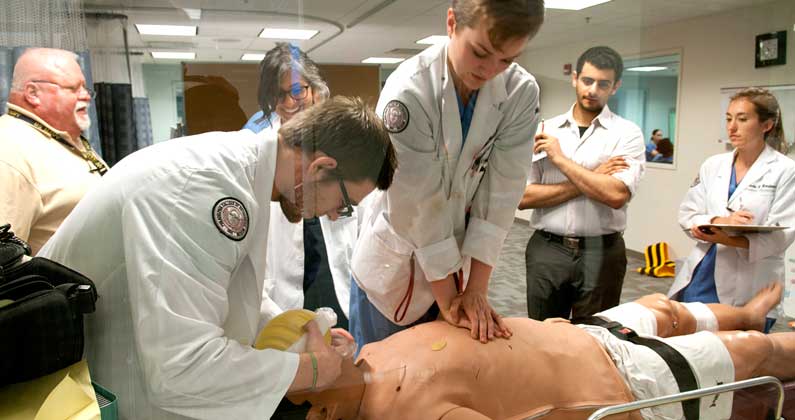New Program Prepares Third Years for Successful Clerkships
August 21, 2015
Students in the class of 2017 were broken into four groups, and for four weeks, each
group participated in a different workshop focusing on various aspects of clinical
knowledge, from taking a patient’s history, to learning how to scrub in for a surgery,
to inserting an IV.
This June, DO students in the class of 2017 received a head start on practicing their
clinical skills before beginning their clerkships, as part of a new curricular program
based in the Saltzburg Clinical Learning and Assessment Center (CLAC). Called the
Intro to Clerkships, or I2C, the initiative was spearheaded on the Philadelphia campus
by Arthur Sesso, DO, professor and chair, surgery. GA-PCOM has held a similar program
for its students for the past several years.
“Medical school is two years of basic science followed by two years of clinical experience,
but there’s little effort to integrate the two,” said Dr. Sesso. “By facilitating
that integration, we give the students a better understanding of what they’re doing,
that it’s more than just memorizing facts in a text book.” I2C rounds out a three-part
series that explores curricular innovations in medical education. The first two programs,
CRIBS (Clinical Reasoning in Basic Science) and PET (Parallel Education Track) aim
to better integrate clinical skills from the very first day of medical school.
Funded by a $225,000 gift from Michael C. Saltzburg, DO '77 (who, along with his wife
Wendy provided the funding for the recently renovated CLAC), I2C was launched as an
effort to help better equip students with the clinical skills they will need as they
begin their clerkships. Students in the class of 2017 were broken into four groups,
and for four weeks, each group participated in a different workshop focusing on various
aspects of clinical knowledge, from taking a patient’s history, to learning how to
scrub in for a surgery, to inserting an IV.
“Having our first clerkship experience on campus, with people we know, for a few hours
each day, was very helpful,” said Robert Gadomski (DO ’17), who most recently was
on an internal medicine clerkship at Lankenau Hospital. “Easing into the process made
me feel more confident.”
Elizabeth Budnik (DO ’17), who recently completed a clerkship in ob-gyn at Reading
Hospital, felt the experience made her better prepared than some of the other students
in her cohort. “During my ob-gyn clerkship, we did estimations of cervical dilations,
which was something we practiced on models during I2C,” she said. “When I did them
during my clerkship, I got two out of three checks correct. I would not have known
what I was feeling without that practice.”
Ms. Budnik’s clinical skills were so strong in fact, that she received honors from
the director of her clerkship. “Ob-gyn is an area I’m very interested in, so it was
a little intimidating to start my clinical experience with it,” she said. “But I2C
helped me be more prepared from the very first day.”
About Philadelphia College of Osteopathic Medicine
Established in 1899, Philadelphia College of Osteopathic Medicine (PCOM) has trained
thousands of highly competent, caring physicians, health practitioners and behavioral
scientists who practice a “whole person” approach to care—treating people, not just
symptoms. PCOM, a private, not-for-profit accredited institution of higher education,
operates three campuses (PCOM, PCOM Georgia and PCOM South Georgia) and offers doctoral degrees in clinical psychology, educational psychology, osteopathic
medicine, pharmacy, physical therapy, and school psychology. The college also offers
graduate degrees in applied behavior analysis, applied positive psychology, biomedical
sciences, forensic medicine, medical laboratory science, mental health counseling,
physician assistant studies, and school psychology. PCOM students learn the importance
of health promotion, research, education and service to the community. Through its
community-based Healthcare Centers, PCOM provides care to medically underserved populations.
For more information, visit pcom.edu or call 215-871-6100.
Contact Us
For general media inquiries, please contact the Office of Marketing and Communications
at 215-871-6300 or communications@pcom.edu. Visit our media relations page to view contact information for public relations personnel.
Connect with PCOM


